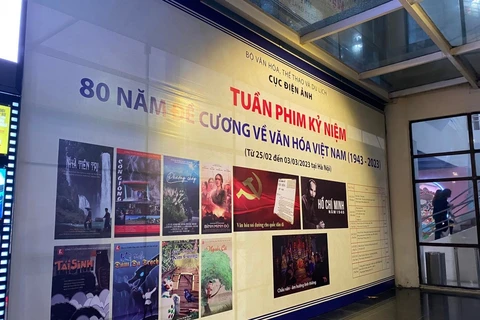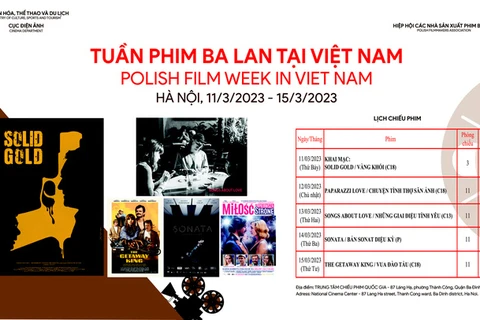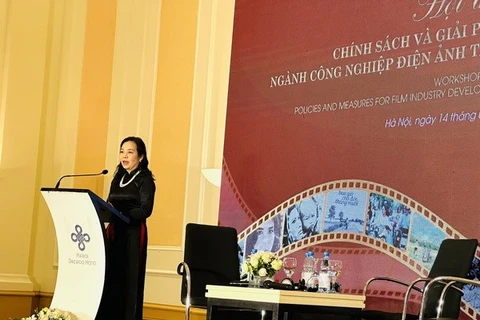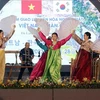 Vietnamese cinema contributes significantly to national history and culture. (Photo: Minh Anh/Vietnam+)
Vietnamese cinema contributes significantly to national history and culture. (Photo: Minh Anh/Vietnam+) This year, 2023, marks the 80th anniversary since the introduction of the Outline of Vietnamese Culture, which clearly outlines three principles of Vietnamese culture, which are nationalisation, massification, and scientificisation.
Researchers commented that these principles not only paved the way for the revolutionary literature and art but also moved along with the course of history to create a foundation for the development of new forms of art and literature with the inclusion of cinema.
The power of cinema
Experts have recognised cinema as a powerful tool for portraying the narrative of a nation.
Screenwriter Trinh Thanh Nha described cinema as an art form capable of conveying information and emotions to the masses through vibrant images and compelling messages.
For a significant period, cultural workers have embraced cinema as a potent weapon for promoting national identity.
This belief has been evident since the inception of Vietnamese cinema in the early 20th century, with films such as “Kim Van Kieu” (The Tale of Kieu) and “Canh dong ma” (The Ghost Field).
During this time, filmmakers deliberately infused their storytelling with a distinct Vietnamese essence to counter the influence of Westernization.
The revolutionary era further accentuated this spirit, producing notable movies like “Bao gio cho den Thang Muoi” (When The Tenth Month Comes), “Chi Tu Hau” (Sister Tu Hau), and “Em be Ha Noi” (The Little Girl of Hanoi).
 In a photograph captured in 2023, People’s Artist Lan Huong is seen alongside her husband, Artist Dang Tat Binh. Lan Huong’s role in the 1974 debut of “The Little Girl of Hanoi” has solidified her status as a renowned figure in the history of Vietnamese revolutionary cinema (Photo: Minh Anh/Vietnam+).
In a photograph captured in 2023, People’s Artist Lan Huong is seen alongside her husband, Artist Dang Tat Binh. Lan Huong’s role in the 1974 debut of “The Little Girl of Hanoi” has solidified her status as a renowned figure in the history of Vietnamese revolutionary cinema (Photo: Minh Anh/Vietnam+). Dr. Ngo Phuong Lan, Chairwoman of the Association for Promotion and Development of Cinema, emphasised that Vietnamese literature and art possess two fundamental characteristics: national and modern aspects.
A good film should effectively reflect the soul of the nation, the essence of life, and a universal perspective through vivid imagery, compelling characters, and unique modes of expression that strongly embody the national identity.
Reaching the global stage through national stories
While cinema is considered a “powerful weapon” in showcasing culture and local stories, the question arises: Do stories that are too closely tied to the local context become unfamiliar to international audiences, making it difficult to gain worldwide recognition?
However, experts assert the opposite. In reality, a story with a strong local essence can still leave a powerful mark on the world stage.
Examples include “Mua He Chieu Thang Dung” (The Vertical Ray of the Sun - nominated for an Oscar in 2001), “Mua Len Trau” (Flood Season or Buffalo Boy – winning special jury prize at the Locarno Film Festival, Switzerland, 2005), and more recently, “Tro Tan Ruc Ro” (Glorious Ashes – winning Gold Award at the Continental Film Festival, 2022).
According to Dr. Ngo Phuong Lan, a creator’s connection to their national identity can manifest in two ways: self-awareness and self-initiation.
Self-initiation occurs when artists express their personal preferences, and their work reflects the essence of their nation.
On the other hand, self-awareness is demonstrated when creative individuals actively infuse the spirit of their nation into their work, bringing forth a vivid, lively, and unique national aspect.
For screenwriter Trinh Thanh Nha, identity represents the traditional imprint deeply ingrained in the subconscious of individuals.
It plays a crucial role in shaping the cultural identity of both the nation and its people.
Consequently, it is the responsibility of today’s filmmakers to honor and explore this cultural identity to prevent its gradual erosion or dilution in the present and future./.























